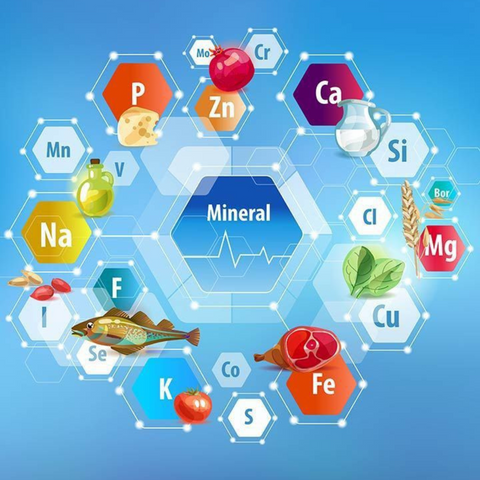
Minerals: The Building Blocks of Your Health
Minerals are essential for health and affect the body in various ways. They make up about 4% of total body weight yet have a significant impact. Minerals build strong bones, maintain a steady heartbeat, and are involved in more than 300 biochemical processes. Calcium alone accounts for about 2% of body weight, while around 70% of the body's iron is found in hemoglobin, which moves oxygen through the body. Without these nutrients, basic functions such as muscle contraction, nerve signals, and energy production could not occur.
What Are Minerals?
Minerals are inorganic substances found in soil and water that enter the body through the food we eat. Unlike vitamins, which are organic and can be broken down, minerals remain intact during digestion. They fall into two main categories:
- Macrominerals: Required in large amounts for functions such as growth, development, metabolism, and immune health. Examples include calcium, magnesium, and iron.
- Trace Minerals: Needed in small amounts (less than 100 mg daily), such as iron, zinc, and iodine. Despite their minimal presence, they play key roles in enzyme activity, hormone production, immunity, and oxygen transport.
Why Are Minerals Important?
Minerals are crucial for many body functions, including:
- Bone and Teeth Health: Calcium, magnesium, and phosphorus build and maintain strong bones and teeth.
- Energy Production: Magnesium and phosphorus assist in energy generation at the cellular level.
- Nerve and Muscle Function: Sodium, potassium, and calcium ensure proper communication between nerves and muscles.
- Immune Support: Zinc and selenium strengthen the immune system.
- Fluid Balance: Electrolytes like sodium and potassium regulate hydration and blood pressure.
Key Macrominerals and Their Functions
-
Sodium
- Average consumption is about 3,400 mg daily, exceeding the recommended limit of 2,300 mg. Ideally, intake should be 1,500 mg for better heart health. Excessive sodium raises blood pressure, while balanced intake supports fluid balance and nerve function. Sources include processed foods, deli meats, and soups.
-
Magnesium
- Involved in over 300 biochemical reactions, including energy production and muscle relaxation. Adults need 310–420 mg daily. Found in whole grains, nuts, seeds, and leafy greens.
-
Calcium
- Strengthens bones and teeth, supports muscle function, and aids in blood clotting. Adults need about 1,000 mg daily. Common sources are dairy, leafy greens, and sesame seeds. Many people, especially women, fall short of the recommended intake, increasing osteoporosis risk.
-
Potassium
- Regulates fluid balance, nerve signals, and muscle contractions, including the heart. Adults need 2,600–3,400 mg daily, often unmet due to low fruit and vegetable intake. Sources include bananas, coconut water, potatoes, and legumes.
-
Phosphorus
- Vital for bones, teeth, and energy production. Adults require about 700 mg daily. Found in dairy, fish, meat, lentils, and nuts.
Important Trace Minerals
-
Iron
- Essential for hemoglobin to transport oxygen throughout the body. Adults need 8–18 mg daily, depending on age and gender. Deficiency is common, especially among women and children. Sources include lentils, spinach, and fortified cereals. Pairing with vitamin C enhances absorption.
-
Zinc
- Plays a key role in immune function, wound healing, and cell growth. Adults need 8–11 mg daily. Sources include legumes, nuts, seeds, and meat.
-
Iodine
- Necessary for thyroid hormones that regulate metabolism. Adults require 150 mcg daily. Found in iodized salt, seafood, and dairy.
How to Track Mineral Intake
Tracking tools can help ensure you meet daily needs:
- Daily Summary: View a snapshot of your intake through food logs.
- Trend Analysis: Track average nutrient consumption over time.
- Highlighted Nutrients: Focus on specific nutrients for targeted progress.
Minerals are not just nutrients but the building blocks of life itself. They existed in the Earth long before life began, and every cell in your body today carries echoes of these ancient elements. The balance of minerals in your body can directly influence how you age. A diet rich in minerals not only supports current health but lays the groundwork for a more active, healthier future.
Nutri Intact brings you the best of nature with our rich and exotic selection of nuts, spices, edible oils, and more. We preserve nature's goodness so you can enjoy wholesome food in your everyday meals. The best way to appreciate our quality is to try it for yourself. Enjoy the earthy aroma while cooking, feel the improvements in your gut health, and experience the balance that true soul food provides.
We are proud to be an FSSAI-licensed brand (Lic. No: 11224333002597).




